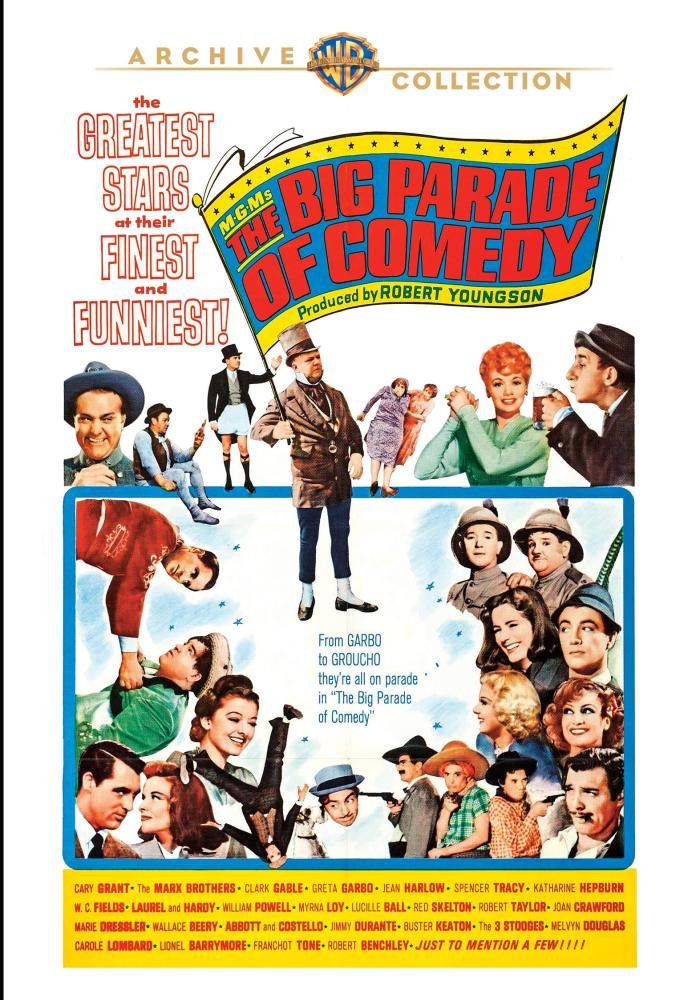
One would expect a collection of clips featuring some of cinema’s greatest comedians and comediennes to be a laugh-a-minute mini-fest; a cinematic party tape devoted entirely to some of the biggest names in comedy during their best moments on-screen. And, while such compilation movies surely exist somewhere, you will not find anything remotely resembling such in MGM’s The Big Parade of Comedy ‒ a dreadful cut-and-paste wonder from the once-respected mind of documentary filmmaker Robert Youngson.
Beginning his career at Warner Bros. in the late 1940s as the director of documentary shorts ‒ two of which won Academy Awards ‒ the Brooklyn-born Harvard alumnus later graduated to crafting feature-length homages to classic comedies. In 1957, Youngson somehow managed to pioneer new ground in film by assembling a “best-of” compilation entitled The Golden Age of Comedy. A loving tribute to the classic Silent Era comedians who risked life and limb for a laugh, Youngson’s effort resulted in a newfound adoration among the younger generations, who were able to see the antics of Laurel and Hardy, Charley Chase, and prolific producer Mack Sennett for the first time.
It also granted Youngson the right to continue editing bits and pieces from long-completed films together in order to create something “new” out of them (an artform Hong Kong exploitation maestro Godfrey Ho would later perfect). Alas, somewhere along the line, Youngson ‒ presumably upset due to his own inability to write/produce/direct something entirely original, began to phone in his sessions inside the editing booth (which Godfrey Ho also later mastered). To this extent, audiences wound up suffering through one lazily-compiled collection of clips after another, which brings us to the 1964 head-shaker MGM’s The Big Parade of Comedy.
Though it features the still-amazing talents of Abbott and Costello, The Marx Brothers, The Three Stooges, Buster Keaton, Laurel and Hardy, and so many more, one cannot shake the feeling Youngson was trolling us hard when he put this snooze-fest together. For you see, boys and girls, most of the funny folk featured in this compilation were contract players at other studios. Every now and again, however, executives would loan out some of the their most popular stars to other studios (usually in exchange for one of their top ‒ or at least rising ‒ talents). Thus, just about every great comedian or comedy group found themselves working in the lion’s den at MGM.
Now, if you’re a fan of classic comedy, you probably already know the films The Three Stooges or Abbott and Costello made at MGM are far inferior to what they made at their native studios of Columbia or Universal, respectively. Sadly, rather than reaching out to other studios for permission to use footage from their contract comedians’ best works, Youngson instead stitched together a film using many scraps from solely MGM-owned properties. And not even the good ones, at that: despite the fact MGM distributed many Laurel and Hardy shorts and features ‒ to say nothing of producing The Marx Bros’ legendary A Night at the Opera ‒ there’s nary a trace of those titles here.
Written (in a huff, by the look and sound of things), produced, and directed by Youngson himself with the assistance of a tiny editing/production crew, the disappointing MGM’s The Big Parade of Comedy‘s only saving grace is hearing Youngson’s tacky writing narrated by B-grade horror/sci-fi great Les Tremayne. Apart from seeing some otherwise great moments in film history reduced to brief snippings and one of the worst-written theme songs ever (warning: don’t listen to the lyrics!), there’s absolutely nothing to keep an established classic comedy lover’s interest here. Even the uninitiated may have a hard time getting past the bad editing and writing. It’s that corny.
For whatever reason other than “the hell of it,” the Warner Archive Collection has added this dud to their library. Considering nearly every frame of the film is made up of stock footage, the print the WAC used for this release looks pretty darn nice overall, and the mono audio is just as adequate. There are no special features present for this title, which is a pity, as the Warner Archive Collection could have at least included a “With Deepest Sympathies” card in lieu of an insert to play up the fact that the joke is on the viewer here. Do yourself a favor and pick up the Warner Bros.’ DVD box sets of The Thin Man or The Marx Bros. and see these movies the way they were meant to be seen: intact.